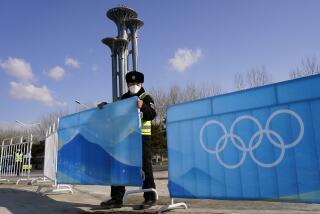China has spy gear in hotels, senator says
- Share via
WASHINGTON — China has installed Internet-spying equipment in all the major hotel chains serving the 2008 Summer Olympics, Sen. Sam Brownback (R-Kan.) charged Tuesday.
Brownback, citing hotel documents he received, said journalists, athletes’ families and others attending the Olympics next month “will be subjected to invasive intelligence-gathering” by China’s Public Security Bureau.
One document said, “In order to ensure the smooth opening of Olympic in Beijing and the Expo in Shanghai in 2010, safeguard the security of Internet network and the information thereon in the hotels . . . it is required that your company install and run the Security Management System.”
The Chinese government has put great emphasis on security around the Games, citing what it calls an unprecedented threat of terrorism in mobilizing a security force larger than many standing armies.
But critics say the security is mostly directed at potential protesters who might air grievances about Tibet or other human rights issues.
In addition to the 110,000 security professionals, 500,000 volunteers with red and yellow armbands have become ubiquitous in Beijing. Ordinary citizens, especially taxi drivers, have been advised to be vigilant for threats.
The Public Security Bureau’s order to the hotels says that failure to comply could result in financial penalties, suspension of access to the Internet or the loss of a license to operate a hotel in China.
“These hotels are justifiably outraged by this order, which puts them in the awkward position of having to craft pop-up messages explaining to their customers that their Web history, communications, searches and key strokes are being spied on by the Chinese government,” Brownback said at a news conference.
Spokesmen at the Chinese Embassy in Washington were not available for comment.
In Beijing, meanwhile, some Internet sites remain blocked at the main Olympic press center and some venues where reporters will work.
Websites such as Amnesty International or any with Tibet in the address could not be opened Tuesday at the main press center, which will house about 5,000 print journalists.
The government routinely blocks Internet access for the Chinese public.
In bidding for the Games seven years ago, China said the news media would have “complete freedom to report.”
And in April, Hein Verbruggen and Kevan Gosper, senior International Olympic Committee members overseeing the Games, said they’d received assurances from Chinese officials that Internet censorship would be lifted for journalists during the Games.
Gosper, however, issued a clarification Tuesday. He said the open Internet extended only to sites related to “Olympic competitions.” He said the freedom to report “didn’t necessarily extend to free access and reporting on everything that relates to China.”
The U.S. State Department issued a fact sheet this year warning travelers attending the Games that “they have no reasonable expectation of privacy in public or private locations” in China.
More to Read
Sign up for Essential California
The most important California stories and recommendations in your inbox every morning.
You may occasionally receive promotional content from the Los Angeles Times.










